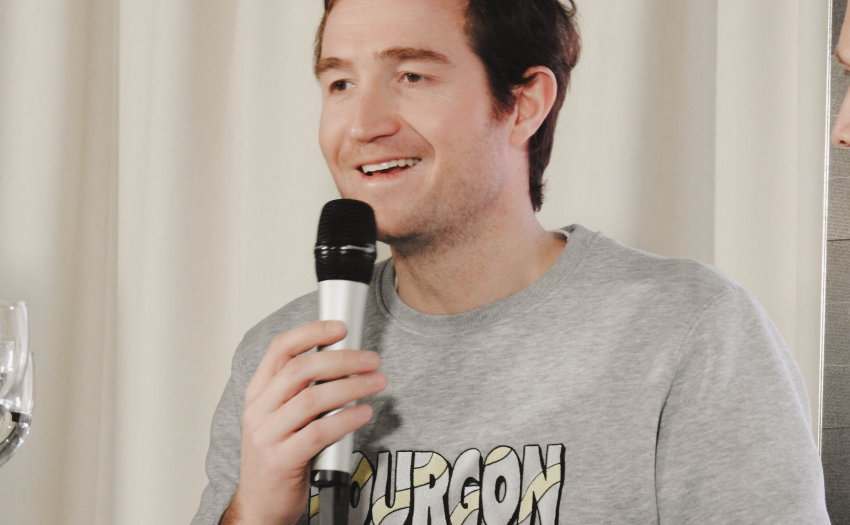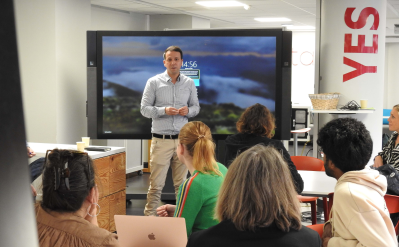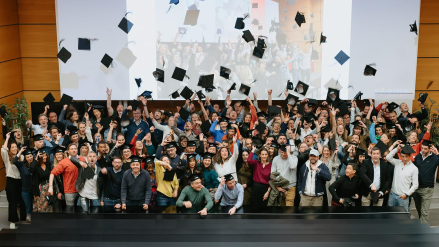News

Reconciling viable and virtuous in a business model: Le Fourgon dusts off the deposit return system!
Charles Christory (SKEMA 2008), Co-founder and CEO of Le Fourgon , was in the spotlight at the SKEMA Alumni Entrepreneurship Club's relaunch event held on 8 February 2024 at the EuraTechnologies Cyber Campus in Lille!
Hosted by the club's two new ambassadors, Henri Bervick (SKEMA 2010), Founder of L'équipée verte, and Justine Thiriez (SKEMA 2011), Founder of Slowmod, this round-table discussion highlighted Charles' rich entrepreneurial journey, which started in 2008 after various international experiences as an employee.
The genesis of Le Fourgon
After setting up Adictiz (SaaS solutions for running gamification marketing campaigns) at EuraTechnologies in 2008, Charles, along with two associates, embarked on the Le Fourgon adventure two years ago. Deeply committed to CSR and conscious of the impact he can make through his lifestyle and professional endeavours, Charles shared with us the thinking behind the construction of his business model. He is looking to combine sustainability and profitability, but also the stages of growth, the management of HR development (almost 300 employees), business development, and the potential difficulties and challenges to overcome!
For those of you who didn’t get the chance to attend the conference, here are the highlights of the evening.
First environmental wake-up call
Charles began his talk by revealing a deep-seated desire that very much drives his business: the desire to make an impact. He explained his initial soul-searching in relation to Adictiz clients. "I can do more". This frank observation led to other reflections. He mentioned a coming-out regarding his mode of transport, a kind of aversion to the car. This new life of getting around on a bicycle made him feel happier and gave him the impression of having more time. It was a turning point that sparked a desire to change all the little things in his daily life that no longer felt aligned.
Charles has 3 children of his own and worries about the world he will be leaving them. He shared with us his determination to do everything possible to have "tried". He doesn't want to pass on a passive, powerless mindset to the younger generation. In his opinion, it is better to act, even if you get it wrong. “Once you realise what kind of world we're going to have in 2100, you can't just say never mind”. His mission is to provide a solution on his level.
What is Le Fourgon? How is its business model constructed?
Le Fourgon has a strong local focus and provides a free same-day delivery service for products packaged in returnable containers. Charles shared an anecdote that echoes the idea behind Le Fourgon: one day, while having a beer with his co-founder, he realised how short the lifespan of the container was. "It's like throwing away your plate at the end of a meal," he shared as a rather effective metaphor.
His experience told him to "go big or go home". One funding round followed another to reach the first objectives, with the aim of expanding the offering as much as possible. According to him, this was a real necessity.
And in terms of profitability today? For the moment, only their first warehouse is profitable; the others aren’t yet. Despite this, the company currently employs around 300 people. He shared with us the emphasis placed on recruitment, and the need to set up an HR team right from the start. He also proudly revealed that some of the employees had left their previous jobs to join Le Fourgon, out of ethical conviction or driven by the ambition to self-actualise in a meaningful company. Le Fourgon offers real opportunities for advancement.
Charles underlined the problem of shopping in hypermarkets which, today, are perfectly comparable to Amazon and the principle of having everything at your fingertips. In his opinion, this model will die out. He envisions a grocery-shopping model shifting toward greater freshness, click-and-collect, and small shops. He gave this example of the incompatibility between environment-focused actions and hypermarkets: Carrefour tried to develop the deposit return system and it resulted in 6,000 bottles being returned each month. A figure achieved by Le Fourgon in less than an hour.
Tips and inside secrets
Above all, Le Fourgon has a solid managerial vision for each site. The teams are autonomous and empowered, and there's a real company culture. Customer service is one of their top priorities: the idea is to respond immediately. As an example of the small initiatives put in place, he shared with us the kick-offs held every week to share best practices with employees and get them involved. Communication also plays a fundamental role, so that nothing is left to chance and everyone's needs are heard.
Finally, he mentioned a core value: enjoyment. Charles doesn’t think anyone should do a job they don't enjoy. This vision involves listening to employees' fundamental needs and promoting well-being in the workplace.
And in 5 years' time? Le Fourgon's goal is to cover 80% of the French population, and to expand abroad, in neighbouring countries especially, because there's a real need. If we look at the beverage market, it represents 30 billion containers per year. According to Charles, recovering even just 2 or 3% of these is a coherent objective.
Questions and answers
After taking us through his journey so far, Charles opened the floor to a Q&A session with the audience. Here are some of the key points that emerged:
- Simply having an idea for a project is worthless. According to Charles, it's the execution that counts. You have to test it out in the real world.
- What about sustainability and metrics at Le Fourgon? Today, we know that each container reuse cycle equals a 70% saving in CO2 emissions — a fact that makes us optimistic about the future of these responsible approaches.
- When can we expect delivery in Paris and its outskirts? Le Fourgon currently faces 3 main obstacles in this regard. First of all, there's stiff competition for delivery services. There are also delivery problems tied to the city's geography, and finally there are logistical issues, as apartments are often difficult to access, with no elevator. There is also the question of loyalty in this area. This in no way detracts from the objective of conquering this part of the country.
- How do you convince partners to buy into the concept? Charles talked about the "sheep effect". We generally don’t want to be the last adopter and lag behind in what consumers value.
- Isn't the project dissonant? Doesn't it ultimately promote another form of consumption? Charles answers in the negative. Le Fourgon’s aim is substitution, not increased consumption. But it’s important to keep these questions in mind and to be careful not to fall into this paradox.
- Finally, what relationship does Le Fourgon have with AI? The company uses artificial intelligence sparingly, initially to determine the semantic relevance of the product selection. It also helps to provide consistent customer service at times when our teams aren’t available. Charles reminded us, however, that AI "is not here to improve the state of the planet".
He concluded with a word of advice: "You have to give yourself the means to change things. Either we take the initiative to do it, or it will be forced upon us".
Thanks to Audrey Touyon, our Alumni Network and Events Coordinator, for organising and introducing this conference.
Be sure not to miss any upcoming events for the opportunity to boost your career and meet passionate and exciting experts!




